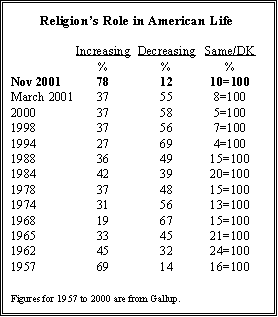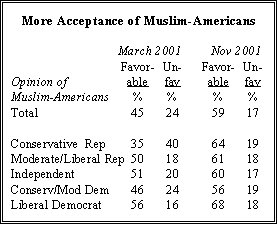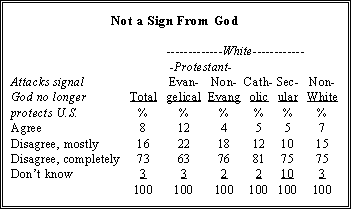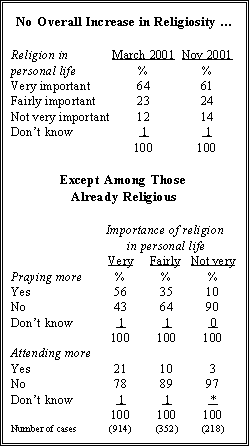Introduction and Summary

The Sept. 11 attacks have increased the prominence of religion in the United States to an extraordinary degree, but not at the expense of acceptance of religious minorities. Fully 78% now say religion’s influence in American life is growing up from 37% eight months ago and the highest mark on this measure in surveys dating back four decades. At the same time, the public has a better opinion of Muslim-Americans than it did before the attacks. Favorable views of Muslim-Americans have risen from 45% in March to 59% today, even though 40% of the public think the terrorists were motivated at least in part by religion when they carried out the Sept. 11 attacks.
The survey finds clear evidence that Americans are heeding President Bush’s call for tolerance toward Muslims, and the president’s own core constituents conservative Republicans have shown by far the biggest turnaround. Nearly two-thirds of conservative Republicans (64%) feel favorably toward Muslims in this country, up 29 percentage points since March.
Despite the improving image of Muslim-Americans, few Americans know much about the Muslim faith and even fewer feel their religion has much in common with Islam. Roughly four-in-ten (38%) say they know something about the Muslim religion and its practices, while 31% see common ground between their own religion and Islam. And while a 49% plurality believes that the terrorists who attacked the United States were motivated primarily by their political beliefs, 30% see mainly religious motives behind the attacks and another 10% see a combination of religious and political factors.

The nationwide survey of 1,500 adults by the Pew Research Center, in collaboration with the Pew Forum on Religion and Public Life, finds broad agreement among all demographic and religious groups that religion now occupies a more important place in American life. Yet this dramatic shift has not been matched by an increase in attendance at religious services nor is there much evidence that religion is playing a larger role in Americans’ personal lives at this time. Attendance stands at the same level as it did in March. More important, the number of Americans who say religion is very important to them personally stands at 61%, virtually the same level as eight months ago.
The survey also asked whether people agreed or disagreed with the following statement: “Some religious leaders have said that the terrorist attacks on the United States signal that God is no longer protecting the United States as much as in the past.” Members of all religions reject this idea. White evangelical Protestants are only somewhat less dismissive of this idea than are others — 63% in this group totally disagree, compared with 73% of the general public.

The public remains solidly behind U.S. military action in Afghanistan and the survey finds that the current war effort taps about as much potential moral support for war as exists among the public. Asked whether war is sometimes or never morally justified, 83% choose the former, which mirrors current support for military action against terrorism (85%). When asked an alternative version of the question, fewer (64%) say war is often morally justified. There is somewhat greater division over how the United States conducts military operations. More Americans (56%) say they worry that the United States doesn’t push hard enough to achieve victory than express concern that the U.S. does too little to avoid civilian casualties (25%).
Religion’s Influence Seen as Growing
The nearly eight-in-ten who see religion gaining influence in American life surpasses measures on this question dating back at least four decades. This figure has not been approached since 1957 when, in a Gallup survey, 69% said the influence of religion was increasing. Since then, the number who said religion was growing in importance has never exceeded 45%.
The change in opinion since March has been striking in most demographic groups, the number of people who say that religion’s influence is growing has doubled. But while solid majorities of all groups now see religion growing in influence, there is a modest gender gap 83% of women say religion is becoming more important, compared with 70% of men.
Despite the public’s overwhelming belief that religion has become more important for the nation, there is little evidence that many Americans who were not actively religious prior to the attacks have turned to religion in the wake of the crisis. Attendance at religious services is comparable to March levels in both surveys roughly four-in-ten say they attend church once a week or more, a third say they attend less frequently, and a quarter report seldom or never attending religious services. About six-in-ten (61%) currently say religion plays a very important role in their lives, virtually unchanged from the 64% who said that in March.

Still, many people say that since the terror attacks they have become more actively religious, especially when it comes to prayer. Better than four-in-ten (44%) say they are praying more, although that represents a significant decline from 69% who reported praying more in the Pew Research Center survey conducted just after the attacks (Sept. 13-17). And 16% say they are attending religious services more now than prior to the attacks.
This apparent contradiction between long-term measures of religious observance, which have been remarkably stable, and the self-reported rise in activity since Sept. 11 is explained with closer examination of those Americans who are praying more and attending religious services more often. The evidence suggests that it is largely those already highly religious who are saying that they have increased their religious activity even further.
Of those who say religion is very important in their lives, 56% are praying more since the attacks, compared with 35% of those who say religion is only fairly important, and just 10% of those who say religion is not very important to them. And while 21% of those who are highly religious say they are attending church more, just 3% of those for whom religion is not very important say the same.
The events of Sept. 11 also have had an impact on how Americans view family life. Nearly four-in-ten (37%) say they are trying to spend more time with family this holiday season as a result of the attacks and better than half (54%) of parents say they are making more of an effort to spend time with their children. More women than men stress an effort to spend extra time with family (41%-33%), and mothers are more likely than fathers to say they are trying harder to spend time with their children (59%-47%).




